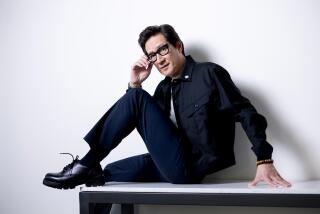‘Loki’s’ enchanting Lady Loki doesn’t like that name. This backstory explains why
This story contains spoilers for Episode 3 of “Loki” on Disney+.
A Loki by any other name is just as dangerous — even when things don’t go according to plan.
Loki (Tom Hiddleston) is in for a few surprises in the third episode of “Loki,” titled “Lamentis,” which picks up directly where the action left off in Episode 2. The titular God of Mischief is interested in teaming up with his counterpart, but the Lady Loki variant (Sophia Di Martino) has other plans.
The episode sees the pair of Lokis learning more about each other (including their romantic lives), raises suspicions that there is likely more to the Time Variance Authority and Time Keepers than has been disclosed on the series so far, and shows that no technology is foolproof.
With twisted timelines and character “variants,” Marvel’s adventure can be hard to keep straight. Here’s an episode-by-episode guide to help you out.
One of the biggest revelations in the episode, however, is Hiddleston’s Loki discovering that Di Martino’s Loki goes by another name.
“Don’t ever call me that … a Loki,” declares the mysterious lady variant-on-the-run. “That’s not who I am anymore.”
The name she goes by instead? Sylvie.
Here’s the significance of that name — and what it might mean for the show moving forward.
Who is Sylvie?
The variant who’s been on the run from the TVA has mentioned more than once that she does not want to be called Loki. Instead, she insists she is Sylvie.
Marvel comic book fans know that Sylvie is a name that invokes some history with Loki.
A 2009 comic book series called “Dark Reign: Young Avengers” (by Paul Cornell and Mark Brooks) introduced a group of superpowered teens calling themselves the Young Avengers... even though there was already a superhero team known as the Young Avengers.
The established team included Wiccan (Billy Kaplan), Speed (Tommy Shepherd), Hawkeye (Kate Bishop), Stature (Cassie Lang) and the Patriot (Eli Bradley), who have all been introduced, or are slated to be introduced, in the Marvel Cinematic Universe in some way.
The wannabe Young Avengers were a bit less heroic, but superpowered nonetheless. One of its members was a young woman going by the alias the Enchantress, who wielded magical powers and spoke using strange, faux Old English.
Enchantress eventually shares that her name is Sylvie Rushton and that after suddenly waking up with magic powers she moved to New York from Broxton, Okla., to live her new superpowered life.
But it turns out that this Enchantress — she’s the second Marvel character to use the alias — was actually created by Loki. And in this run of the comic book, Loki was a woman, and a more traditional villain, who “liked the idea of creating a mortal who suspects she’s one of my kind.”
‘Loki’ director Kate Herron explains how they made Miss Minutes — plus, we dig into the comic book storylines behind this week’s big reveal.
What does this mean?
The revelation that “Loki’s” Lady Loki, who is a master of enchantments, prefers to be called Sylvie could just be a nod to the character’s comic book history. But if viewers have learned anything from watching the films and TV shows from the Marvel Cinematic Universe, things are not always that simple.
In “Dark Reign: Young Avengers,” it’s mentioned that part of Loki’s MO is creating traps — so Enchantress could be some sort of trap for the existing Young Avengers. Whether “Loki’s” Sylvie is also a trap, and for whom, is yet to be revealed.
On the other hand, the MCU does not often feature completely comic book-accurate character backstories, so this could just be a detail to throw off viewers chasing Marvel Easter eggs to further their fan theories.
Happy Pride! Loki is canonically bisexual.
Episode 3 has made it official: Loki is queer.
Loki and Sylvie have some time to try to get to know each other a little better over the course of the episode, and among the topics they cover is romance.
When Sylvie asks if there have been any special “would-be-princesses” or “another prince” in Loki’s life, he answers “a bit of both. I suspect the same as you.” Sylvie confirms that yes, she too has found companionship among both genders.
“Loki” series director Kate Herron took to Twitter to confirm Loki’s bisexuality and why it was important for her that the show acknowledged his identity.
“From the moment I joined [‘Loki’] it was very important to me, and my goal, to acknowledge Loki was bisexual,” tweeted Herron. “It is a part of who he is and who I am too. I know this is a small step but I’m happy, and [my] heart is so full, to say that this is now Canon in [the MCU.]”
‘Loki’ director Kate Herron and head writer Michael Waldron break down the first episode of the Disney+ series
Loki’s sexuality has been addressed in the comics: In the 2013 “Young Avengers” series, young adult Loki mentions his “culture doesn’t really share [human] concept[s] of sexual identity. There are sexual acts, that is it.” He is generally understood to be canonically pansexual and genderfluid in comics and books.
It should be noted that bisexual and pansexual are distinct queer identities, but while the MCU’s Loki did not claim a specific label within the show, his attraction to more than one gender is explicitly confirmed. This is a big step for the MCU, which has for years been called out for its abysmal track record when it comes to LGBTQ inclusion.
More to Read
The complete guide to home viewing
Get Screen Gab for everything about the TV shows and streaming movies everyone’s talking about.
You may occasionally receive promotional content from the Los Angeles Times.







